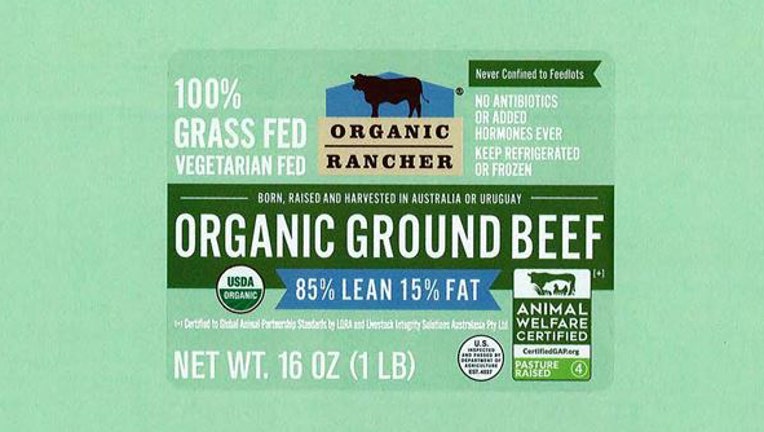Whole Foods ground beef may be tainted with E. coli, USDA says

The U.S. Safety and Inspection Service shows a package of Organic Rancher ground beef sold at Whole Foods markets. (Photo courtesy of the U.S. Food Safety and Inspection Service)
Ground beef sold at Whole Foods stores across the country may be contaminated with possible dangerous E. coli, according to the U.S. Department of Agriculture.
What’s the brand of ground beef that might be tainted?
Why you should care:
USDA officials issued a public health alert for 1-pound, vacuum-packed packages of Organic Rancher beef, produced on May 22 and May 23, by NPC Processing Inc., of Shelburne, Vermont. These products have use-by dates of June 19 and June 20.
A recall was not requested by U.S. Food Safety and Inspection Service officials since the meat products are no longer available for consumers to buy. But individuals with the product are urged to throw it away or return it to the store.
RELATED: Publix recalls baby food pouches due to lead levels
The Associated Press noted that the ground beef was manufactured in Australia or Uruguay and processed in the U.S. This meat was sent to distributors in Connecticut, Georgia, Illinois, and Maryland and then to Whole Foods stores.
Company officials contacted the U.S. Food Safety and Inspection Service to inform them that they shipped beef products that tested positive for E. coli. Officials told the Associated Press that no illnesses connected to the beef product have been reported.
What is E. coli?
Dig deeper:
E. coli is a type of bacteria that can cause serious illnesses and it can cause infections with symptoms like dehydration, diarrhea and cramps.
RELATED: Target baby food recalled over elevated lead levels, FDA warns
The Centers for Disease Control and Prevention (CDC) noted that most individuals recover within a week, but some people can become severely ill and develop a dangerous kidney condition. Children under the age of 5 and older adults are most at risk.
The Source: Information for this story was provided by the Associated Press, the U.S. Food Safety and Inspection Service, and the Centers for Disease Control and Prevention. This story was reported from Washington, D.C.

